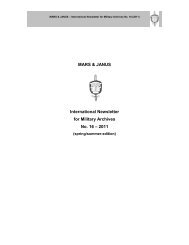National Experiences - British Commission for Military History
National Experiences - British Commission for Military History
National Experiences - British Commission for Military History
You also want an ePaper? Increase the reach of your titles
YUMPU automatically turns print PDFs into web optimized ePapers that Google loves.
96 ai r p o w e r in 20 t H Ce n t u ry do C t r i n e s a n d em p l o y m e n t - nat i o n a l ex p e r i e n C e s<br />
tary service. The following protests expressed by France, Great Britain and Italy,<br />
which decided on a mild <strong>for</strong>m of protest, must have confirmed Hitler’s assessment<br />
concerning the weakness of democracies. On 19 March 1935, the German Air Force<br />
showed in public <strong>for</strong> the first time: During a blackout and live air defense exercise,<br />
the “Jagdgeschwader Richthofen” appeared on the skies over Berlin.<br />
The fact that the German translation of Douhet’s book was published under the<br />
title of “Luftherrschaft” (air supremacy) in June 1935, i.e. only a few weeks after the<br />
German Air Force had been established, cannot be considered pure coincidence if one<br />
takes the efficient apparatus of Josef Goebbels, the Minister of Public Enlightenment<br />
and Propaganda into consideration. In the <strong>for</strong>eword to the book, Lieutenant Colonel<br />
Freiherr v. Bülow, who meanwhile had become the Director of the “Foreign Air<br />
Forces” division at the “Luftkommandoamt”, the later general staff of the German<br />
Air Force, emphasized that the establishment of the German Air Force was a welcome<br />
point of time to present Douhet’s thoughts to a broader public in Germany.<br />
Notwithstanding all of the comprehensible arguments regarding the decisive importance<br />
of Douhet’s doctrine, Bülow emphasized: „we are not committed to it“. 28<br />
With this, Bülow not only spoke in “pluralis maiestatis”, but he reflected the basic<br />
view held by the commanders of the new German Air Force. The speech held by the<br />
then chief of the Luftkommandoamt, Major General Walther Wever, on the occasion<br />
of the opening of the Air War Academy at Gatow on 1 November 1935, was proof of<br />
an air war concept differing from Knauss’ ideas. For Wever, operational cooperation<br />
between Air Force, Army and Navy in their fight against enemy armed <strong>for</strong>ces had<br />
priority, even if he considered the bomber aircraft the decisive weapon of the air war<br />
and did not rule out its strategic use against enemy armaments industry. 29<br />
Here a special feature of the German Air Force command authorities must be<br />
pointed out. Comparisons with the organization of Anglo-American command authorities<br />
reveal that there was no policy planning staff. Whereas the Anglo-American<br />
supreme command authorities planned within an overall strategic setting, across<br />
continents and <strong>for</strong> lengthy wars of attrition, irrespective of day-to-day business, the<br />
continental power of the Reich, if only <strong>for</strong> lacking the appropriate resources, focused<br />
on winning a war as quickly as possible by conducting rapid army operations. 30<br />
As a result, the efficient support of such army operations automatically got into<br />
the center of air war considerations in the German Air Force. In a certain way, it<br />
became apparent that the entire higher officer corps of the German Air Force was<br />
composed of <strong>for</strong>mer army officers “who were of course first reluctant to use the wide<br />
range of operational possibilities of waging an independent air war and who, above<br />
28 Giulio Douhet, Luftherrschaft. Berlin 1935, p. 9.<br />
29 Maier, Totaler Krieg und operativer Luftkrieg (see Note 19), p. 44.<br />
30 Cf. Horst Boog, Anglo-amerikanisches Führungsdenken im strategischen Bombenkrieg von 1939<br />
bis 1945 in Abhängigkeit von wechselnden Kriegsbildern, in: Groß, Führungsdenken (see Note 2),<br />
p. 219.



